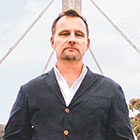
Made To Give: A New Paradigm In Carbon-Based Capitalism Delivers A Triple Bottom Line
We’re all made to give, and we all have talents that we can use to benefit those who are less fortunate if we put them to good use. There’s a new movement of creative thinkers using their talents to build passion-based businesses embedded with generosity and uncommon sense. These businesses, built around social and environmental responsibility raise millions of dollars, impact hundreds of thousands of lives and engage hearts, hands and minds. Don’t sit on the sidelines admiring these types of businesses; step out and become one. Every company, no matter its size, has the opportunity to unlock the creative energy and passion of its people by focusing on giving back. It can change lives, as well as make very profitable and uncommon business sense.
America has its faults, but there is absolutely no doubt that we are a generous nation, one that cares about those in need. We gave away about $300 billion last year, most of which came from individuals. Compare what we give to just a small portion of the money that fuels the for-profit financial markets. Money under management in private equity firms alone was estimated at $2.5 trillion last year. So moving just 10% of those funds into investment models designed for social impact would double our efforts to help the poor. And what better way to move that money than to offer investors competitive returns? As we explore this fascinating model, think about how you can shift your business model to one that’s made to give.
Do the hard work of studying a market and systemic problems with rigor. The discipline of understanding a market or territory for an extended period of time will give you a fresh perspective that can yield transformational solutions to existing problems.
After studying the carbon markets for a non-profit organization planting millions of trees each year, Paradigm Project’s creatively analytical CEO, Neil Bellefeuille, realized that $125 billion is exchanged through the international carbon markets every year and is expected to grow astronomically over the next two decades. The Paradigm Project was born to identify, fund and develop carbon-related projects that deliver immediate social benefits to communities while simultaneously building environmental and economic value for the future.
Designing solutions for problems that live in a written brief or from the slides of a research deck will never be a replacement for living, and studying the lives of the people for whom you hope to design solutions. Get out in the field and live a day or a week in their shoes.
After investigating a wide variety of projects, replacing open-fire cooking with fuel-efficient stoves proved to be transformational. More than 2.5 billion people (nearly half the world’s population) still cook every meal over an open fire, many in an indoor setting. With far-reaching effects on global climate change, health and the economic well-being of families (1.6 million people die annually from lower-respiratory disease related to indoor smoke and it is the number one killer of children under five-years-old), improving this process presented a significant opportunity for change.
The emissions from open fires and the deforestation associated with cooking fuel use are creating a perilous negative environmental and economic cycle that is difficult to reverse. Fewer trees and hotter temperatures mean less rain and lower crop yields. Lower yields mean more hardship and less disposable income. Less income means more reliance on the land, which is yielding ever-less. Efficient stoves greatly reduce all of these issues. And, if closely monitored, they can produce carbon offsets from the reductions they create in greenhouse gas emissions.
Being conservative is the privilege of those with something to conserve. Look at how you can design opportunities for change and giving back with traditionally conservative products and services. Explore the unexpected with the most conservative and stable products and services in your portfolio, you might be surprised by the upside.
Paradigm Project has developed a compelling answer to these issues: large-scale projects that work with local suppliers to create and sell stoves, monitor their use, register and sell the carbon offsets and recycle the profits back to the project as well as other community needs. It’s a business doing good things and producing a profit by doing so. Families save money and time, and also enjoy health improvements. The environment benefits; jobs are created with local manufacturers, distributors and retailers. Profits pay for the ongoing development costs, adding to the pool of funds available for other needs. It’s the ultimate in sustainable development. Paradigm’s Kenya project is slated to touch the lives of 25 million people over the next 10 years, and to return an above average internal rate of return to its investors.
The bottom line is no longer the only measurement of success by which companies will be judged. If you haven’t studied the transformational power of the triple bottom line, now’s the time. Investing in new models of measuring success can be transformational internally and externally.
The Paradigm Project has created a connected triple bottom line model which creates jobs through the manufacturing and sales of carbon efficient stoves in the country where the projects are created. They are reducing the output of carbon dioxide into the atmosphere and, at the same time, improving the health of the people using the new stoves. They are reducing the dependency on natural resources, delivering a financial return for both investors in their fund and the communities as well as improving lives. It’s an example of brilliant simplicity at work.
While the institutional measures of financial success are important, there’s an opportunity to innovate around, and deliver on, the triple bottom line—and it isn’t just a nice idea, it’s going to be vital to stay relevant. Explore and understand the investment and innovation opportunities that revolve around sustainable business practices, taking the role your company plays in the greater scheme into account. Reduce both inputs and outputs, and explore how to genuinely demonstrate care and consideration for the people who work for you and the communities you depend on. This will all add up to deliver significant benefits in employee productivity, retention and attraction, and the overall financial performance of the company. Pay close attention to your triple bottom line, and ensure that people, planet and profits are connected.


Uncommon Person: Chad Hutson

Our Internal Learning & Impact at Bulldog Drummond

The One Decision by Employers in 2021 that Means Everything

What I Wish I Knew

Standing Up Inside

Uncommon Person: Gregg Imamoto

Five Things Every Company Should Know about ESG

Redefining Value

Uncommon Person: Chris Baréz-Brown

It’s Time For A Whole Lotta Common Good

Did You Choose Humanity?

Uncommon Partnership: Violux

Here’s How

Uncommon Person: Santhosh Nair

Designing Strategy For A Complex World

Responsibility & Relevance for Brands

